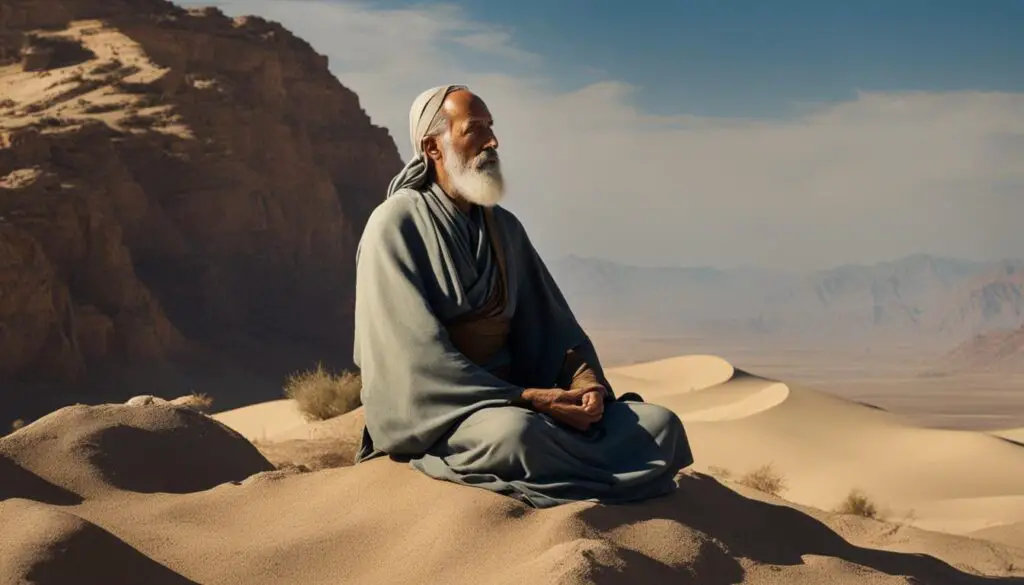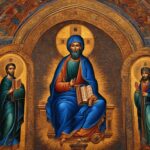Step into the extraordinary life of St. Paul of Thebes, the first desert hermit and anchorite in early Christian monasticism. His quest for solitude in the vast desert of Thebes and his unwavering devotion to God have left an indelible mark on the development of Christian asceticism.
In this insightful exploration, we delve into the remarkable story of St. Paul of Thebes, from his early life and background to his profound spiritual philosophy. We’ll also uncover the challenges and criticisms he faced, the recognition he received, and the miracles attributed to him, ultimately leaving a lasting legacy that continues to inspire and guide spiritual seekers.
Key Takeaways:
- St. Paul of Thebes is hailed as the first desert hermit and anchorite in early Christian monasticism.
- His journey into solitude began after a betrayal forced him to flee to the desert.
- St. Paul of Thebes felt a deep calling to embrace extreme asceticism and devotion to God.
- He dedicated his life to prayer, self-denial, and the pursuit of holiness.
- St. Paul of Thebes’s solitary lifestyle faced challenges and criticism, but he remained steadfast in his path.
Early Life and Background
St. Paul of Thebes, an Egyptian ascetic, was born in the Thebaid region of Egypt. Coming from a wealthy family, he received a comprehensive education that encompassed Greek and Egyptian learning. However, tragedy struck when his parents passed away, and he faced betrayal by his own brother-in-law. Forced to escape persecution, St. Paul sought refuge in the desert, where his life of solitude and asceticism began.
Amidst the stark landscapes of the desert, St. Paul discovered a profound spiritual calling. Inspired by the examples set by the desert fathers, such as St. Antony, he felt drawn to embrace a life of extreme devotion to God. This marked the beginning of his journey into the world of monasticism, seeking a path of prayer, self-renunciation, and spiritual enlightenment.
“The Thebaid region of Egypt gifted the world with St. Paul of Thebes, an Egyptian ascetic who left behind a life of privilege to forge a path of solitude and spiritual discipline in the desert. His profound dedication to asceticism, rooted in his early life experiences, would shape the future of monasticism.”

Call to Religious Life
St. Paul of Thebes encountered a deep spiritual calling during his time in the desert. Influenced by the stories of the desert fathers, he felt compelled to dedicate himself to a life of rigorous asceticism and devotion. The desert became his refuge and training ground as he sought to cultivate a closer relationship with God through prayer, fasting, and self-denial.
Inspired by the solitude and discipline of the desert, St. Paul’s commitment to monasticism served as a profound example for future generations of Christians seeking a higher spiritual purpose. His steadfast resolve and unwavering faith continue to inspire individuals to explore the depths of their own spirituality, just as he did centuries ago.
Call to Religious Life
In the vast desert of Thebes, a transcendent calling beckoned St. Paul. Inspired by the humble lives of the early desert fathers, such as St. Antony, he sensed a deep yearning within his soul to embark on a solitary path of profound devotion to God.
With unwavering resolve, St. Paul of Thebes dedicated himself to a life steeped in prayer, fasting, and self-denial. He abandoned the comforts and distractions of the world, seeking a spiritual connection that could only be forged in the austere wilderness.
“The desert offers solace to those who seek the presence of God, for it is in the silence and solitude of this barren expanse that the soul finds its truest voice.”
Through the trials and solitude of the desert, St. Paul became a trailblazer for future generations of Christian monks. His resolute commitment to a life of asceticism laid the foundation for the monastic traditions that followed.
As he renounced the material world and embraced the arduous path of self-denial, St. Paul exemplified the beauty and transformative power of a life wholly devoted to God. His journey would inspire countless others to tread the path of the desert fathers, seeking enlightenment and spiritual communion through a life of solitude.

Embracing the stark simplicity and liberation of the desert, St. Paul of Thebes found solace, clarity, and an indomitable connection with the Divine. His profound spiritual quest serves as a timeless reminder that true fulfillment lies not in the abundance of worldly possessions, but in the boundless depths of the human spirit.
Work
St. Paul of Thebes dedicated his life to the profound work of prayer and contemplation in the vast desert. Seeking solitude and divine communion, he found solace in a cave that he believed was a sacred gift from God. In this secluded space, St. Paul relied on the sustenance provided by a solitary palm tree as he delved deeper into his spiritual journey.
His days were filled with intense spiritual disciplines, tirelessly striving for a closer union with the divine. Through prayer, fasting, and self-mortification, St. Paul sought to purify his heart and align his will with God’s. In this pursuit, he exemplified the fervent dedication that defined early Christian monasticism.

Spiritual Life and Philosophy
St. Paul of Thebes, the renowned desert hermit and anchorite, embraced a philosophy centered around extreme asceticism and detachment from worldly possessions. He firmly believed that through rigorous self-discipline and the renunciation of earthly desires, one could attain a profound union with God. St. Paul’s spiritual journey involved practicing intense fasting, sleep deprivation, and the mortification of his body as a means of purifying his soul.
The Path of Asceticism
St. Paul of Thebes’s commitment to a life of solitude led him to adopt ascetic practices that were both physically and mentally demanding. He believed that by embracing the hardships of the desert and enduring various privations, one could achieve spiritual enlightenment and transcend the boundaries of human existence.
“The true measure of spiritual strength lies in the ability to detach oneself from worldly possessions and desires. Only when we shed the distractions of the material world can we truly commune with the divine.”
In his pursuit of a closer union with God, St. Paul of Thebes saw material possessions as obstacles that hindered his spiritual growth. He renounced all worldly attachments, embracing a life of simplicity and detachment. By divesting himself of possessions and focusing solely on his relationship with God, St. Paul embodied the essence of monasticism and became an inspiration to future generations of desert hermits and monks.
Embracing Solitude
For St. Paul, solitude was not a means of isolation, but rather a path to spiritual transformation. Removed from the distractions of society, he sought communion with God through contemplation and prayer. His experiences in the desert deepened his understanding of the human condition and the power of inner peace.
St. Paul’s spiritual philosophy emphasized the importance of self-reflection and introspection. Through his solitude, he sought to conquer the passions of the flesh and purify his heart. His unwavering commitment to a life of prayer and asceticism stood as a testament to the transformative power of solitude and laid the groundwork for the development of monasticism.

St. Paul of Thebes’ unwavering dedication to extreme asceticism and detachment from worldly desires continues to inspire seekers of spiritual enlightenment to this day. His philosophy serves as a reminder of the transformative power of self-discipline and the pursuit of a deeper connection with the divine.
Challenges and Criticisms
Even though St. Paul of Thebes dedicated his life to the solitary path of a desert hermit, he faced numerous challenges and criticisms along the way. His extreme asceticism was met with skepticism and disapproval by many. Some viewed his practices as excessive and unnecessary, failing to see the deeper spiritual purpose behind his austere lifestyle.
One of the main points of contention was the practicality and sustainability of his solitary existence in the harsh desert environment. Critics questioned how he could survive in such conditions without the support of a community or basic amenities. However, St. Paul remained undeterred, relying on his unwavering faith and the providence of God to sustain him.
“He who abides in God’s service is met with all kinds of opposition. And he who flees from men will encounter more than when among them.”
Despite the challenges and criticisms, St. Paul persevered in his commitment to his chosen path. He saw his solitude not as a burden, but as a means to draw closer to God. His unwavering resolve and profound faith continue to inspire and resonate with those who seek a deeper spiritual connection in their own lives.
Comparison of Challenges and Criticisms
| Challenges | Criticisms |
|---|---|
| Surviving in the harsh desert environment | Excessive and unnecessary ascetic practices |
| Isolation and lack of community support | Skepticism regarding the sustainability of solitary life |
| Dependence on divine providence | Failure to understand the deeper spiritual purpose |

Recognition and Awards
St. Paul of Thebes, known as a Christian saint, is widely recognized and revered for his unparalleled devotion and unwavering pursuit of holiness. His exceptional life as a desert hermit has garnered admiration and respect from fellow Christians throughout history. St. Paul’s example and teachings have significantly influenced the development of monasticism, making him a true pioneer in the field.
“St. Paul of Thebes showed us the true essence of dedication and selflessness in his solitary life of prayer and asceticism. His unwavering commitment to God has inspired countless individuals to follow a similar path of devotion and seek spiritual enlightenment,”
St. Paul’s profound impact on monasticism cannot be overstated. His solitary journey in the desert has served as a source of inspiration and guidance for monks and religious seekers alike, providing them with a blueprint for living a life of solitude, prayer, and devotion. He has instilled in them a deep understanding of the transformative power of self-discipline and steadfast faith.
Miracles and Path to Sainthood
St. Paul of Thebes, the renowned Christian saint, was known for the numerous miracles attributed to him during his lifetime. According to ancient legends and accounts, St. Paul possessed extraordinary abilities to heal the sick, drive out demons, and perform acts of divine intervention that defied human understanding. These miraculous deeds, witnessed by many, served as a testament to his unwavering faith and exceptional holiness.
St. Paul’s reputation for miracles and his profound impact on the lives of those around him eventually led to his canonization as a saint in the Christian faith. His extraordinary abilities to channel divine power and bring about supernatural interventions were seen as a clear sign of his close relationship with God.
Throughout his ascetic life in the desert, St. Paul of Thebes became a beacon of hope for those seeking spiritual solace and divine intervention. His presence alone seemed to radiate a divine energy that could transform lives and restore faith in even the most desperate situations.
Legends surrounding St. Paul’s miracles continue to captivate and inspire believers to this day. These tales of divine intervention serve as a reminder of the power of faith and the profound impact one individual can have on the lives of others.
“By witnessing the miracles that St. Paul of Thebes performed, we are reminded of the boundless power of God’s love and the infinite possibilities that exist within our own lives.”
Miracles Attributed to St. Paul of Thebes
| Miracle | Description |
|---|---|
| Healing the sick | St. Paul was said to possess the ability to cure various ailments and diseases through prayer and the laying of hands. |
| Driving out demons | He was known for his ability to cast out evil spirits and restore peace to those afflicted by demonic possession. |
| Water into wine | There are accounts of St. Paul miraculously transforming water into wine, reminiscent of the biblical story of Jesus at the wedding in Cana. |
| Food multiplication | In times of scarcity, it is believed that St. Paul multiplied small amounts of food to feed large crowds of people in the desert. |
| Protection from wild beasts | St. Paul was said to have tamed and protected wild animals in the desert, allowing him to coexist peacefully with nature. |
The documented miracles attributed to St. Paul of Thebes leave no doubt about the extraordinary nature of his spiritual journey and divine calling. His acts of compassion and supernatural intervention are a testament to the power of faith in overcoming adversity and bringing about profound transformations.
Legacy and Continuing Influence
St. Paul of Thebes, the pioneer of desert hermit monasticism, has left an indelible mark on the monastic tradition. His unwavering commitment to a life of solitude and asceticism has served as an enduring source of inspiration for countless individuals.
The example set by St. Paul of Thebes continues to resonate with monks and seekers of spiritual enlightenment who are drawn to the desert hermit lifestyle. His profound teachings on detachment from worldly possessions and the pursuit of holiness have guided generations in their quest for a deeper union with God.
Through his extraordinary dedication, St. Paul has established a legacy that lives on in the monastic communities and spiritual practices that have been shaped by his influence. Monks around the world still look to his life as a source of strength and guidance in their own journeys of self-discipline and self-sacrifice.
The Influence of St. Paul of Thebes
St. Paul of Thebes’ commitment to solitude and asceticism has deeply influenced the monastic traditions of Christianity. His example has been instrumental in shaping the philosophies and practices of those who seek a life of spiritual devotion.
– Father Gregory, Monastery of the Holy Cross
As the first desert hermit and anchorite, St. Paul of Thebes paved the way for the development of early Christian monasticism. His radical approach to spirituality challenged conventional norms and inspired others to embrace the path of solitude and self-denial.
St. Paul’s influence extends beyond the boundaries of monasticism. His teachings and way of life have inspired individuals from all walks of life to reflect on the importance of simplicity, detachment, and self-sacrifice in their own spiritual journeys.
| Legacy of St. Paul of Thebes | Continuing Influence |
|---|---|
| Established the foundation of desert hermit monasticism | Guides seekers of spiritual enlightenment |
| Inspired generations of monks to pursue lives of solitude and asceticism | Shapes the philosophies and practices of monastic communities |
| Challenged conventional norms and redefined the concept of holiness | Influences individuals outside of monasticism to practice simplicity and self-sacrifice |
The enduring legacy of St. Paul of Thebes is a testament to the profound impact he had on the development of Christian spirituality. His teachings and way of life continue to inspire individuals seeking a deeper connection with God and a meaningful spiritual journey.
Reflections and Personal Testimonies
The life and teachings of St. Paul of Thebes have left an indelible mark on the hearts and minds of many throughout history. His unwavering faith and deep spiritual insight continue to inspire and guide those who seek a life dedicated to solitude and devotion to God.
Personal testimonies from individuals who have encountered the story of St. Paul of Thebes echo with admiration and awe. They speak of the profound impact his life has had on their own spiritual journeys, as they find solace and inspiration in his example of extreme asceticism and renunciation of worldly desires.
In the face of challenges and criticisms, St. Paul remained steadfast in pursuing his chosen path as a desert hermit and anchorite. His commitment to extreme self-discipline and unwavering faith has resonated with many, who find in his story a reminder of the importance of perseverance and dedication in the spiritual quest.
Today, the legacy of St. Paul of Thebes lives on, continuing to touch the lives of those who seek a deeper understanding of their relationship with God. His story serves as a timeless reminder that true spiritual enlightenment often requires solitude, self-denial, and a profound trust in divine providence.
FAQ
Who was St. Paul of Thebes?
St. Paul of Thebes was the first desert hermit and anchorite in early Christian monasticism. He lived a life of solitude in the desert of Thebes, Egypt, and had a profound impact on the development of Christian asceticism.
What was St. Paul of Thebes’ background?
St. Paul of Thebes was born in the Thebaid region of Egypt to a wealthy family. He received a high level of education in Greek and Egyptian learning. However, after the death of his parents, he was forced to flee to the desert to escape persecution by his brother-in-law.
What inspired St. Paul of Thebes to embrace a life of solitude?
Inspired by the examples of previous desert fathers, such as St. Antony, St. Paul of Thebes felt a deep calling to dedicate himself to a life of extreme asceticism and devotion to God. He saw the desert as a place where he could find a deeper union with God.
What was St. Paul of Thebes’ work as a desert hermit?
St. Paul of Thebes dedicated his life to prayer and contemplation in the desert. He lived in a cave provided by God and survived on the food and shelter provided by a palm tree. His primary work consisted of intense spiritual discipline and self-mortification in pursuit of a closer union with God.
What were St. Paul of Thebes’ spiritual beliefs and practices?
St. Paul of Thebes embraced a philosophy of extreme asceticism and detachment from worldly possessions. He believed that through rigorous self-discipline and the renunciation of worldly desires, one could achieve a closer union with God. His practices included fasting, sleep deprivation, and the mortification of his body to purify his soul.
Did St. Paul of Thebes face any challenges and criticisms?
Yes, St. Paul of Thebes faced challenges and criticisms during his life as a desert hermit. Some viewed his extreme asceticism as excessive, while others questioned the practicality and sustainability of his solitary lifestyle in the harsh desert environment. However, he remained committed to his chosen path.
How is St. Paul of Thebes recognized in the Christian faith?
St. Paul of Thebes is venerated as a Christian saint for his exceptional devotion and pursuit of holiness. His life as a desert hermit garnered recognition and admiration from fellow Christians. His example and teachings influenced the development of monasticism, and he is considered a pioneer in the field.
What miracles are attributed to St. Paul of Thebes?
St. Paul of Thebes was attributed with several miracles during his lifetime. Legends tell of his ability to heal the sick, drive out demons, and perform other extraordinary acts of divine intervention. These reported miracles contributed to his eventual canonization as a saint in the Christian faith.
What is St. Paul of Thebes’ legacy?
St. Paul of Thebes left a lasting legacy in the monastic tradition. His radical commitment to a life of solitude and asceticism inspired countless individuals to follow in his footsteps. The desert hermit lifestyle he embraced became an important model for later generations of monks seeking spiritual enlightenment and union with God.
How has St. Paul of Thebes influenced individuals?
Throughout history, many individuals have reflected upon the life and teachings of St. Paul of Thebes. Personal testimonies often describe his unwavering faith, deep spiritual insight, and the profound impact he has had on their own spiritual journeys. His story continues to inspire and guide those who seek a life of solitude and devotion to God.
















